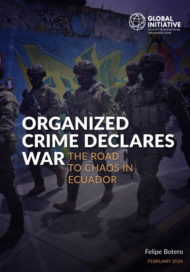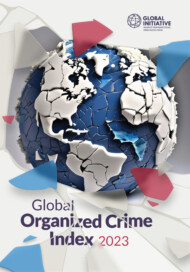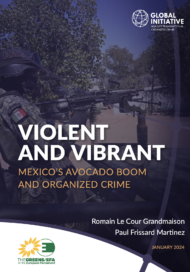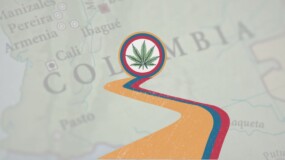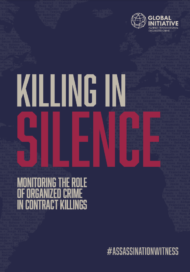For years, Ecuador enjoyed a relative degree of peace, as its neighbours, Colombia and Peru, were wrangling with internal conflicts as chief protagonists in the international supply of cocaine. However, things have changed dramatically in recent times. On 9 January 2024, the recently elected president, Daniel Noboa, said that the country was in a state of ‘internal armed conflict’ against 22 criminal groups that he described as ‘narco-terrorists’.
One of the most visible incidents of Ecuador’s growing problem with violence occurred in August 2023 when presidential candidate Fernando Villavicencio was assassinated at a campaign rally in Quito just weeks before the elections. Since Villavicencio’s murder, several incidents have occurred, including the arrest of the Colombian hitmen involved in his death and their subsequent murders in a prison, which has deprived the authorities of crucial evidence in the investigation.6 The year 2023 ended as the most violent recorded in the history of Ecuador.
The situation in Ecuador is complex, and more research into the political-economic factors behind how this once stable country descended into violent, crime-driven chaos needs to be undertaken if we are to fully comprehend the situation. Nevertheless, there are some key features of Ecuador’s criminal landscape that we do understand, and which can at least partly explain how the country has arrived at this critical juncture.
The existence of at least three intertwined criminal markets, the presence of transnational organized crime groups as well as local criminal networks, and the country’s poor resilience capacity to respond to and mitigate the effects of organized crime are all pivotal to understanding the complex criminal ecosystem that has emerged in force in recent years. In the last edition of the Global Organized Crime Index, published in September 2023, scores for Ecuador’s criminal markets and criminal actors are revealing.
This analysis provides but an initial understanding of the background. A more comprehensive assessment of how intersecting criminal markets, like arms trafficking and extortion, operate in the country will be essential in formulating sustainable, practicable responses to the crisis.
El crimen organizado declara la guerra
El camino hacia el caos en Ecuador
Durante años, Ecuador disfrutó de un relativo grado de paz mientras sus países vecinos, Colombia y Perú, se sumían en conflictos internos como principales protagonistas del suministro internacional de cocaína. Sin embargo, las cosas han cambiado drásticamente en los últimos tiempos. El 9 de enero de 2024, el recién elegido presidente, Daniel Noboa, declaró que el país se encontraba en un estado de «conflicto armado interno» contra 22 grupos criminales a los que calificó de «terroristas».
Uno de los incidentes más visibles del creciente problema se produjo en agosto de 2023, cuando el candidato presidencial Fernando Villavicencio fue asesinado en un acto de campaña en Quito pocas semanas antes de las elecciones presidenciales. Desde el asesinato de Villavicencio se han producido varios incidentes, entre ellos la detención de los sicarios colombianos implicados en su muerte y sus posteriores asesinatos en una prisión, lo que ha privado a las autoridades de pruebas cruciales en la investigación. El año 2023 se registró como el más violento en la historia de Ecuador.
La situación en Ecuador es compleja y es necesario investigar más a fondo los factores político-económicos que explican por qué este país, antes estable, se ha sumido en un caos violento impulsado por la delincuencia. Sin embargo, hay algunas características clave del panorama criminal de Ecuador que sí comprendemos y que pueden explicar, al menos en parte, cómo el país ha llegado a esta coyuntura crítica.
La existencia de al menos tres mercados criminales entrelazados; la presencia de grupos de crimen organizado transnacional, así como de redes criminales locales; y la débil resiliencia del país para responder y mitigar los efectos del crimen organizado son elementos fundamentales para comprender el complejo ecosistema criminal que ha surgido con fuerza en los últimos años. En la última edición del Índice global de crimen organizado, publicado en septiembre de 2023, las puntuaciones de los mercados y actores criminales de Ecuador son reveladoras.
Este análisis tan solo ofrece una primera perspectiva de los antecedentes. Una evaluación más exhaustiva de cómo operan en el país los mercados criminales interconectados, como el tráfico de armas y la extorsión, será esencial para que las autoridades ecuatorianas y otras partes interesadas formulen respuestas sostenibles y viables a la crisis en Ecuador.
